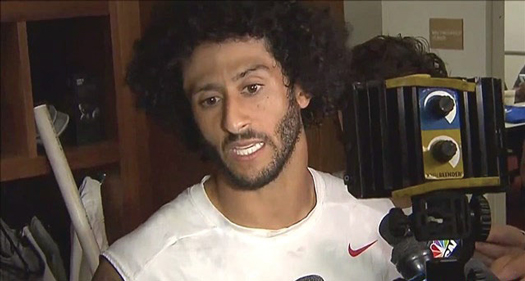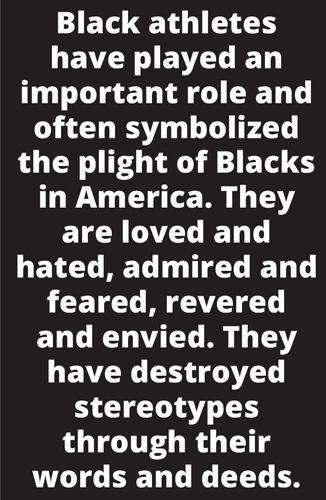When Taking A Seat Is A Stand For Justice
By Final Call News | Last updated: Aug 31, 2016 - 12:22:04 PMWhat's your opinion on this article?

Colin Kaepernick, San Francisco 49ers quarterback, explains why he sat during the National Anthem. Photo: MGN ONline
|
“Oh say can you see?” Apparently Colin Kaepernick of the San Francisco 49ers can see very well and refuses to ignore the injustice that permeates American society.
The professional football player refused to stand for the national anthem and has indicated he will not stand because there is too much wrong in the United States, especially the killing of Black people by law enforcement officers.
“I am not going to stand up to show pride in a flag for a country that oppresses Black people and people of color,” Mr. Kaepernick told NFL media in an exclusive interview. “To me, this is bigger than football and it would be selfish on my part to look the other way. There are bodies in the street and people getting paid leave and getting away with murder.”
According to NFL.com, the refusal to stand for the national anthem came before the 49ers’ preseason loss to Green Bay at Levi’s Stadium. He also failed to stand at least once at another pre-season game, said NFL.com.
His decision brought out the Twitter trolls with racist rants and inevitable denunciations of the quarterback as a “nigger.” It brought a lot of media coverage and pressure but the onetime Super Bowl quarterback doesn’t plan to retreat.

|
“This is not something that I am going to run by anybody,” he told NFL.com. “I am not looking for approval. I have to stand up for people that are oppressed. ... If they take football away, my endorsements from me, I know that I stood up for what is right.”
His public statements are part of an awakening after he learned more about American injustice and inequality.
But Mr. Kaepernick’s words sting Americans who would rather deny any problem exists and they feel especially insulted.
Professional sports and professional football is one of the gods of American society. Sports heroes are imbued with the mantle of, well, heroes, and fans live and die with their adversity. Triumphs are a collective and vicarious joy and defeats are collective and vicarious pain. On the field athletes talk about family, teamwork, love of the organization and caring for one another in what is a cruel and duplicitous business.
Fans watch football to escape reality. To see Black and White together all one color, whatever the team uniform is, brings a superficial feeling that everything is all right—at least on Sundays.
Though Black players are often singled out for derision and insult when things don’t go right, the altar of professional football cherishes the mythical idea that things are fine and we can be one.
Any intrusion into that sacred fantasy realm is taken as a desecration of the temple, a disruption and an unwelcome jolt back to reality.
Black athletes, in particular, earn millions and are showered with affection and fame and fortune. They even marry White women. They are privileged and seen as those who have ascended into a post-racial heaven so any complaint is sacrilegious.
Any break from the norms and ready embrace of America, mom, hot dogs, the flag and apple pie is seen as a traitorous act that must be punished financially and socially. If they could, these whitewashed fans would punish rebellious athletes physically.
It is all the more disturbing for many as this football star is bi-racial and was adopted by a White family. Surely, his life story and wealth are a testament to the glorious and magnanimous miracle called America? When he made the issue bigger than himself and associated with his own people, Black people, and people of color, he rejected all of the accumulated privilege and was branded an ungrateful mulatto by many.
Yet while they laud the beauty of America and her democracy, are those rights only to be exercised when the nation is not challenged? Does the right of free speech only exist when the free speech mimics what a racially divided society wants to hear?
If Mr. Kaepernick is an American citizen, he has the right to express himself. He didn’t do anything ugly, disrespectful or derogatory. He made a simple personal statement about his personal and political beliefs. Fans in the stands disrespect the national anthem in a lot of worse ways than he ever could every game.
If he is, in reality, not a citizen his protest is all the more necessary.
Black athletes have played an important role and often symbolized the plight of Blacks in America. They are loved and hated, admired and feared, revered and envied. They have destroyed stereotypes through their words and deeds—consider the example of Muhammad Ali accepting Islam as taught by the Hon. Elijah Muhammad, a new name and refusing to fight in Vietnam. Consider the Black Power salute by athletes Tommie Smith and John Carlos during their medal ceremony at the 1968 Summer Olympics in the Olympic Stadium in Mexico City. Having won gold and bronze medals in the 200 race, each raised a black-gloved fist, which was kept in the air until the “Star Spangled Banner” finished playing. Consider Kareem Abdul Jabber, who incensed the NBA’s Milwaukee Bucks franchise by accepting Islam and changing his name from Lew Alcindor. Consider Jim Brown who stepped away from football at the height of his career and made major social and political statements and engaged in activism. Consider Jack Johnson, the first Black heavyweight boxing champion who refused to conform to White norms and who beat down the myth that the Black was a coward and not a warrior. There are others, including LeBron James, Carmello Anthony, Dwayne Wade and those who have made strong statements about America’s racial woes.
We salute Colin Kaepernick for his great courage. We pray he will endure the pain enemies will try to inflict on him. His stand for what is right, what is just, makes him a true hero.
INSIDE STORIES AND REVIEWS
-
-
About Harriett ... and the Negro Hollywood Road Show
By Rabiah Muhammad, Guest Columnist » Full Story -
Skepticism greets Jay-Z, NFL talk of inspiring change
By Bryan 18X Crawford and Richard B. Muhammad The Final Call Newspaper @TheFinalCall » Full Story -
The painful problem of Black girls and suicide
By Charlene Muhammad -National Correspondent- » Full Story -
Exploitation of Innocence - Report: Perceptions, policies hurting Black girls
By Charlene Muhammad -National Correspondent- » Full Story -
Big Ballin: Big ideas fuel a father’s Big Baller Brand and brash business sense
By Bryan Crawford -Contributing Writer- » Full Story






 Click Here Stay Connected!
Click Here Stay Connected!








